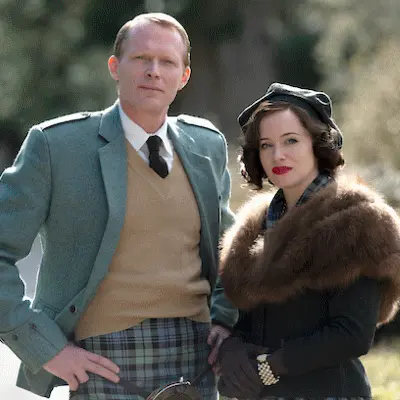Claire Foy and Paul Bettany are at the top of their games in Amazon's A Very British Scandal, but its timeliness may be its biggest flaw
-

The three-part limited series based on the 1963 "divorce of the century" — "and what it says about the double standards to which women in the public eye are held — feels eerily timely in the wake of our recent re-examination of how figures like (Britney) Spears and (Pamela) Anderson have been treated in the media," says Amber Dowling. "The story never fails to drive that message home, but in end that may also be its biggest flaw." Yet Foy and Bettany shine in A Very British Scandal. Their "emotional performances that will undoubtedly garner attention come awards season," says Dowling. "Their driving takes, along with the beautiful cinematography and world-building that went into the period piece are indeed the main reasons to watch. Director Anne Sewitsky’s careful, female-forward handling of the sexual subject matter also goes a long way — it’s impossible to witness the story unfold without anger bubbling up over Margaret’s treatment throughout. Foy’s ability to draw sympathy even when her character is at her worst spars perfectly with Bettany’s delicately layered performance."
ALSO:
- A Very British Scandal doesn’t really feel like a companion piece to A Very English Scandal: "It’s a tenuous brand that’s been further confused by the recent premiere of Netflix’s comically bad, narratively similar Anatomy of a Scandal," says Daniel Fienberg. "It isn’t as pleasurable as A Very English Scandal, nor does it cut as deep, even if Bettany and Foy are entirely worth watching and some of the modern echoes hit home."
- A Very British Scandal is ultimately as empty as the two empty people it focuses on
- If being a cold fish is, as the cliché would have it, a British quality, then A Very British Scandal is very British indeed
- Read about the true story behind A Very British Scandal
- Claire Foy and Paul Bettany discuss A Very British Scandal: "It's a story of two people who meet, who marry, and their ultimate divorce that ends up happening, which is messy and complicated and they're both messy and complicated," says Foy. "But I also think it's a bigger story of how their relationship was played out in public, and how they used the media, and how the media portrayed them, and particularly her, and how played the legal system in the UK, and how it was all in the man's favor." Bettany describes his character as "a real no-goodnik. I play an impoverished aristocrat in need of a new source of income and he finds one on a train in (Foy's character). He's a drunk, a pill-popping bore, and then they play a divorce out in public, and his class surround him and protect him, and she is then cleaved from the herd and thrown to the wolves."
TOPICS: A Very British Scandal, Prime Video, Claire Foy, Paul Bettany
More A Very British Scandal on Primetimer:
